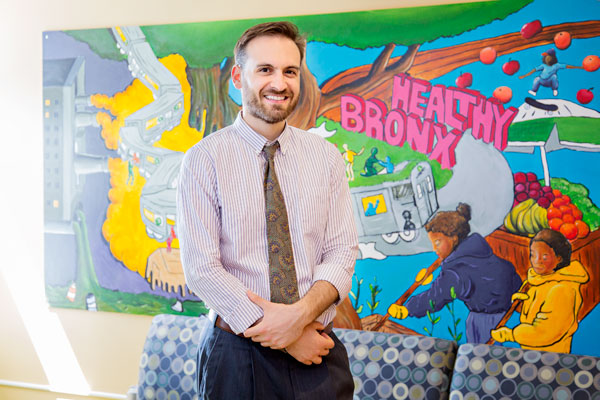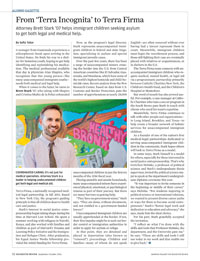Alumni Gazette
 COORDINATED CARING: It’s not just for medical specialists. Attorney Stark is a leader in helping undocumented children get both legal and medical aid. (Photo: Shannon Taggart for Rochester Review)
COORDINATED CARING: It’s not just for medical specialists. Attorney Stark is a leader in helping undocumented children get both legal and medical aid. (Photo: Shannon Taggart for Rochester Review)A teenager from Guatemala experiences a schizophrenic break upon arriving in the United States. He finds his way to a shelter for homeless youth, hoping to get help identifying and replenishing his medication. The medical professional available that day is physician Alan Shapiro, who recognizes that this young person—like many unaccompanied immigrant youths—needs both medical and legal help.
When it comes to the latter, he turns to Brett Stark ’07, who (along with Shapiro and Cristina Muñiz de la Peña) cofounded Terra Firma, a nationally recognized medical-legal partnership, in fall 2013. Based in New York City, the program’s guiding principle is that all children deserve health care and justice.
Stark’s interest in social justice entrepreneurship began taking shape during his time at Harvard Law School. He spent a summer working with refugees in Nairobi, Kenya, and also worked with families and children as part of Harvard’s Trauma and Learning Policy Initiative and the Immigration and Refugee Clinic. After graduation, his Equal Justice Works fellowship provided the initial funding for Terra Firma.
Now, as the program’s legal director, Stark represents unaccompanied immigrant children in federal and state litigation, specializing in asylum and special immigrant juvenile cases.
Over the past few years, there has been a surge of unaccompanied minors crossing the border into the U.S. from Central American countries like El Salvador, Guatemala, and Honduras, which have some of the world’s highest homicide and child-homicide rates. Recent analysis from the Pew Research Center, based on data from U.S. Customs and Border Protection, puts the number of apprehensions at nearly 28,000 unaccompanied children in just the first six months of the 2016 fiscal year.
Fleeing unstable and unsafe homelands, many unaccompanied minors have experienced physical, emotional, or psychological trauma as part of their journey. But there are many barriers to getting help.
“They have no government status,” Stark says. “They are alone, without documents, and not entitled to a government-funded lawyer.”
Unaccompanied immigrant children are usually apprehended at the border. If not, their first impulse might be to seek out border control or immigration authorities in order to apply for asylum or refuge.
At that point, they are detained and placed in deportation (also known as “removal”) proceedings. Children and families—many of whom do not speak English—are often removed without ever having had a lawyer represent them in court. Meanwhile, immigrant children must begin the resettlement process, and those still fighting their case are eventually placed with relatives or acquaintances, or in shelters in the U.S.
The Terra Firma team connects with unaccompanied immigrant children who require medical, mental health, or legal aid via a programmatic partnership primarily between Catholic Charities New York, the Children’s Health Fund, and the Children’s Hospital at Montefiore.
But word of mouth has also proved useful. For example, a case manager at Catholic Charities who runs a soccer program in the South Bronx puts Stark in touch with clients who need his team’s expertise.
Meanwhile, Terra Firma continues to talk with other people and organizations—in Long Island, Brooklyn, and Texas—to help create a broader network of holistic services for unaccompanied immigrant children.
As a founder of one of the nation’s first medical-legal partnerships dedicated to serving unaccompanied immigrant children in the community, Stark hopes others will look to Terra Firma as a model.
In some ways, Stark himself is a model for others, especially for those interested in social justice entrepreneurship. That’s why Gretchen Helmke, a professor of political science and Stark’s undergraduate thesis supervisor, invited the political science major to speak at the department’s undergraduate diploma ceremony this year.
“It was important to invite someone in the beginning or middle of their career,” says Helmke. “For students majoring in political science or international relations, we wanted to present diverse career paths or ways for them to become social entrepreneurs.” Stark’s “heroic legal work and dedication to education and advocacy,” she says, made him the ideal choice.
For his part, Stark gratefully accepted the invitation.
“I reflect on what I’ve done with the skills and tools that Professor Helmke, the department, and the University gave me,” he says. “These are skills and tools I still use today in my work and that enable me to give back.”

